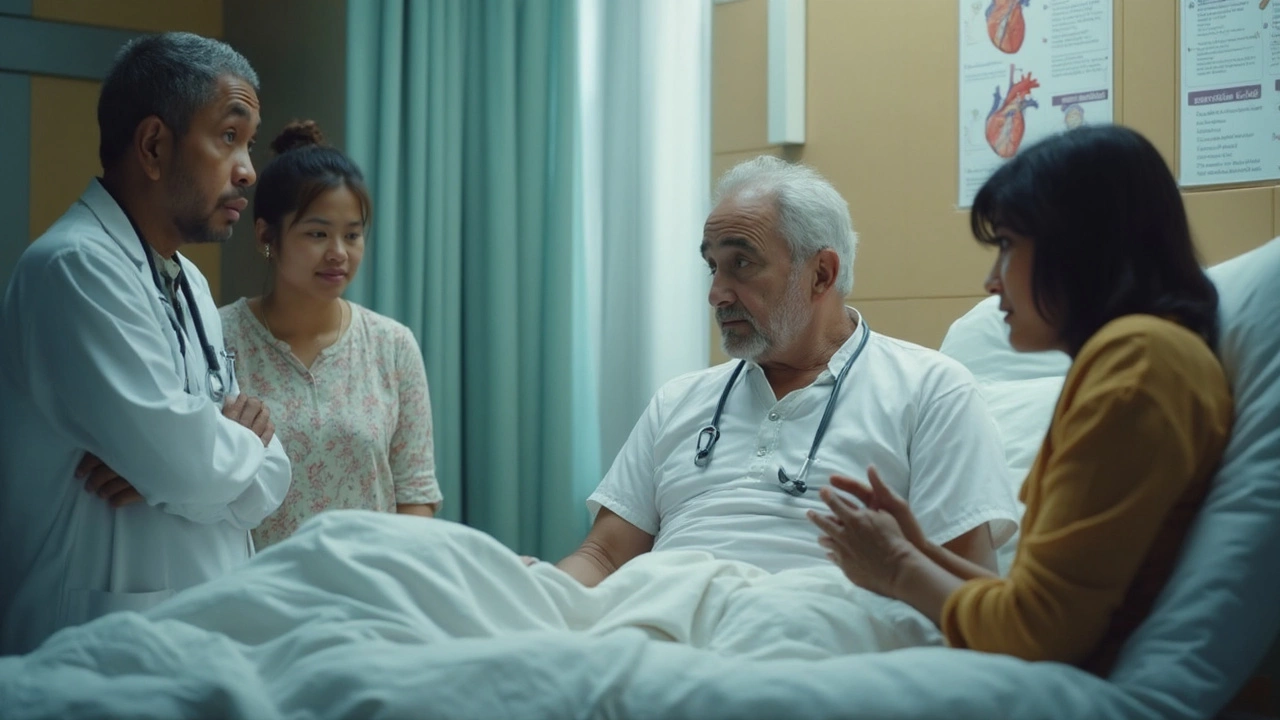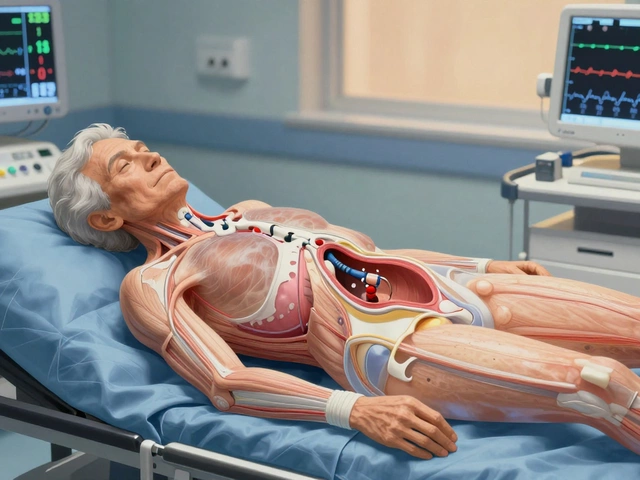Right after open-heart surgery, people sometimes notice something strange—their loved one just doesn’t feel like the same person anymore. Maybe Dad is suddenly forgetful, or your usually calm partner is now moody and anxious. It’s confusing and, honestly, pretty scary. But here’s the thing: these personality shifts aren’t all that rare, and there’s a reason behind them.
If you or someone you care about has just been through heart surgery, you might be seeing changes you never expected—like memory blips, sadness, sharp mood swings, or even a totally different sense of humor. This isn’t a sign of “going crazy.” The surgery itself, the stress on the body, the medication, and even the heart-lung machine used in the operation can scramble things in the brain for a while.
The change often shows up soon after surgery but sometimes it sneaks in weeks later. Most people eventually get back to their old selves, but for a few, these changes stick around much longer. Knowing what’s normal and what’s worrisome can make a huge difference in the recovery process—for both the patient and the family.
- What Happens to the Brain During Open-Heart Surgery?
- Signs of Personality Change After Surgery
- Why Do These Changes Happen?
- Tips for Coping with Emotional and Mental Changes
- When to Seek Help—and What to Expect Long-term
What Happens to the Brain During Open-Heart Surgery?
During open-heart surgery, things get intense for your body and mind. Surgeons often use a heart-lung machine to keep blood and oxygen pumping while your heart is stopped. This is totally necessary but can shake up how blood flows to the brain, at least for a while. Even tiny shifts in oxygen levels or blood pressure make the brain more sensitive right after surgery.
It’s not just the stress of surgery either. Anesthesia, medications, and inflammation all mess with how the brain works. For some, it causes brain fog or trouble concentrating—doctors call this ‘postoperative cognitive dysfunction.’ It’s so common that up to 30% of patients over age 60 notice memory issues or slower thinking right after heart surgery. The good news? Most bounce back within a few months.
Sometimes, little clots or air bubbles can sneak into the bloodstream during the operation. These can temporarily block tiny blood vessels in the brain, leading to things like confusion, sudden mood changes, or even minor strokes. Hospitals work hard to prevent this, but it can still happen even in the best places.
Here’s a breakdown of what’s going on during surgery that can mess with the brain:
- The heart-lung machine changes how blood and oxygen move through the brain.
- Anesthesia and pain meds affect memory, mood, and awareness.
- Inflammation from the body’s response to surgery can trigger brain fog.
- Blood clots or air bubbles can block blood flow briefly, causing confusion.
| Possible Brain Effects | How Common? |
|---|---|
| Short-term memory loss | About 30% of older adults |
| Delirium/confusion | Roughly 20% of all patients |
| Personality changes | Noticeable in 10–20% of cases |
So it’s not just your imagination if someone seems different after surgery. These effects are well-known, often temporary, and doctors are getting better at spotting them quickly. Still, it helps everyone involved to know what can happen and why, so there’s less panic if shifts in mood or personality show up.
Signs of Personality Change After Surgery
It’s not just in your head—personality changes after open-heart surgery are real, and lots of people notice them. The signs can look a little different for everyone, but there are some pretty common patterns doctors and families spot over and over.
- Mood swings: Someone who’s usually easygoing might get irritable, snappy, or cry without warning.
- Anxiety and depression: Feeling unusually worried or down is very common. In fact, about 1 in 5 people who have major heart surgery recovery report serious anxiety or depression afterward.
- Forgetfulness: Short-term memory problems can pop up—even simple stuff like forgetting recent conversations or where you put your phone.
- Confusion and brain fog: After surgery, clear thinking can be a struggle. It may feel hard to focus or follow conversations, especially in busy places.
- Changes in sleep: Trouble falling asleep or sleeping too much both affect mood and thinking. Sleep issues after surgery are pretty normal but can add to those changes in how someone acts.
- Personality shifts: Maybe someone who used to love jokes suddenly takes things very seriously, or they seem flat and just not themselves.
These signs usually show up in the first days or weeks after the operation, but sometimes they take longer to develop. Here’s a look at what families and patients have reported, according to recent hospital studies:
| Personality Change | % of Patients Reporting |
|---|---|
| Mood swings | 40% |
| Memory problems | 30% |
| Anxiety or depression | 20% |
| Major behavior change | 10% |
Spotting these changes early is key. It helps families know this isn’t a personal issue—it’s part of the recovery for some people. If you’re noticing more than just a bad day, or if these changes are sticking around, it’s worth talking to the doctor. Sometimes they’re a sign something else needs checked out, and quick action can really help the person get back to their old self.

Why Do These Changes Happen?
This is where things get surprisingly complex. When someone goes through open-heart surgery, it’s not just the heart that’s under stress—so is the brain. A big reason for personality or mood shifts is the temporary use of the heart-lung machine. During surgery, this device takes over for the heart and lungs, but it sometimes messes with the normal flow of oxygen and nutrients to the brain. Even a short dip in oxygen can lead to what doctors call “postperfusion syndrome” or the less formal “pumphead.”
It’s not just the machine, though. There are other factors in the mix:
- Anaesthesia and Medications: The drugs used in and after heart surgery recovery can affect memory and emotions. It isn’t uncommon for people to feel foggy or irritable for days or even weeks.
- Small Strokes: Tiny, unnoticed strokes can happen during surgery. They don’t paralyze you, but they can mess with thinking and mood.
- Inflammation: Your whole body’s immune system ramps up during and after surgery. That inflammation can reach the brain and make it harder to think clearly or feel like yourself.
- Psychological Stress: Facing major surgery is scary. That stress alone can trigger anxiety, depression, or angry outbursts as the person tries to cope.
- Sleep Disruption: Hospitals aren’t great for restful sleep. Confusion and mood swings often go hand-in-hand with bad sleep.
Dr. Mark Newman, a leading heart surgeon, explains it pretty plainly:
"Even with the best surgeons and technology, there's always a risk of short-term or even long-term changes in mood, personality, or memory after major heart surgery."
If you’re a numbers person, here’s something to chew on. Studies say up to 60% of patients notice some sort of mental or emotional change after open-heart surgery—though for most folks, things get better over a few months.
| Change | How Common After Surgery | Usually Improves? |
|---|---|---|
| Memory Problems | Up to 40% | Yes, for most within 3-6 months |
| Mood Swings/Anxiety | About 35% | Often gets better |
| Personality Change | 10–20% | Can last but often fades |
So, in short: there isn’t just one cause. Personality changes after open-heart surgery hit people in different ways and for lots of reasons. Knowing the “why” makes it easier to be patient—with yourself or your loved one—during the ups and downs.
Tips for Coping with Emotional and Mental Changes
If you’re facing a personality change after open-heart surgery, don’t panic—this happens more often than people think. Recovery isn’t just about scars and stitches; your mind needs healing too. Here’s how to tackle these bumps in the road:
- Talk to someone you trust. Don’t bottle up what you’re feeling. Friends, family, or even a support group with other heart surgery survivors can help you make sense of what’s happening. Honest conversations bring loads of relief.
- Include your doctor in the loop. It’s easy to shrug off mood swings or memory glitches, but you should let your doctor know. Sometimes small tweaks—like changing a medication—can make a huge difference.
- Stick with routines. Familiar habits give your brain something stable to hold onto. Keeping a regular sleep schedule, eating at set times, and having daily rituals take some pressure off your mind.
- Exercise, even a little. Getting your body moving, as the doctor allows, boosts endorphins and helps clear the mental fog. Even a daily walk counts.
- Write things down. Memory not as sharp? Use sticky notes, phone reminders, or a notebook for appointments, tasks, or even just how you’re feeling each day.
There’s data to back this up. Studies show up to 40% of heart surgery patients report feeling more anxious or depressed after surgery, and about 1 in 5 have some memory problems that fade over time. Here’s a quick look:
| Issue | % of Patients Affected | How Long It Lasts |
|---|---|---|
| Mood Changes | 40% | Weeks to Months |
| Cognitive/Memory Problems | 20% | Weeks, Often Improves |
If things feel overwhelming, consider talking with a counselor familiar with heart recovery. They can help spot what’s “normal” and teach you coping tricks that really work. Above all, know that you’re not alone—a lot of folks riding this roller coaster end up stronger in the long run.

When to Seek Help—and What to Expect Long-term
Changes after open-heart surgery grab your attention, especially when someone you care about just isn’t acting like their usual self. But when do these personality changes cross the line from normal recovery to something to worry about? Here’s what to look for and what usually happens down the road.
If the person is forgetful, moody, or acting totally different in ways that don’t improve after a few weeks, that’s a signal to check in with a doctor. Some red flags should never be ignored:
- Confusion that gets worse or doesn’t fade over time
- Major memory loss that goes beyond simple forgetfulness
- Depression, especially if there are signs of hopelessness or talk of self-harm
- Problems making simple decisions or following a conversation
- Hallucinations, paranoia, or believing things that aren’t true
Keep in mind, about 20% to 50% of patients notice some kind of cognitive or emotional hiccup after heart surgery recovery, but the good news is most get better within six months. Family support makes a huge difference—don’t try to handle these changes alone. If you’re not sure what’s normal, call the heart surgeon’s office or your family doctor for advice. Don’t wait for things to blow up before speaking up.
Here’s what you can likely expect as the months pass:
- Most memory lapses and mood swings improve in the first 3 to 6 months.
- Patients who stay active, join cardiac rehab, or stick with routines recover smoother and faster.
- If symptoms don’t improve after half a year, more testing or specialist help (like a neurologist or counselor) might be needed.
- For a small percent, lasting shifts in personality or memory may be part of ongoing recovery, especially in older adults or those with previous strokes.
One thing that really helps? Keeping a small notebook or using your phone to track changes and share those notes with your healthcare team. Patterns matter more than one-off days.
Not sure if it’s time to ask for help? Trust your gut—if something feels off, it probably is. Early support makes a huge difference. No one expects you to handle this stuff all on your own, and asking for help isn’t a weakness—it’s just smart.
| Common Issue | Usually Gets Better? | When to Get Help |
|---|---|---|
| Mild memory issues | Yes, often in 3-6 months | If it gets worse or doesn’t improve |
| Mood swings | Yes, usually fades with time | If severe or linked to depression |
| Serious confusion | Sometimes | Right away |
| Hallucinations/paranoia | Rarely, needs attention | Immediately |








